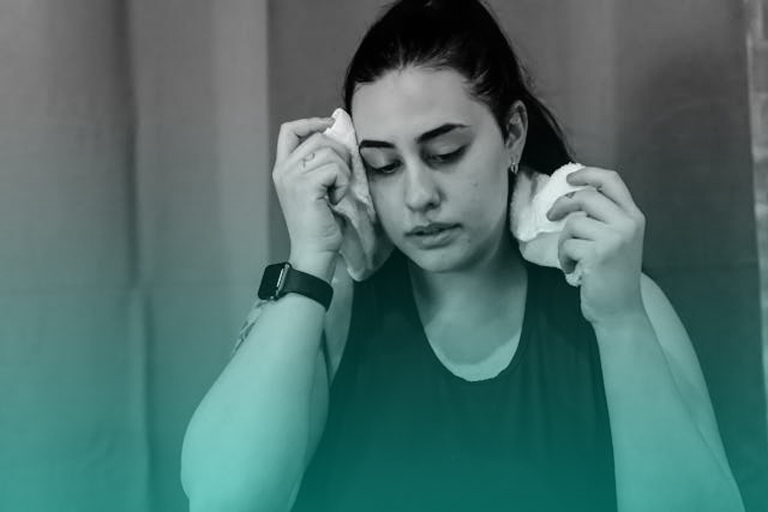
Medically Reviewed by Gaston Molina, Clinical Psychologist & Therapist
How to Manage Anxiety Sweating: Expert Tips and Strategies

Anxiety sweating can be an uncomfortable and embarrassing experience for many individuals. When anxiety strikes, the body’s natural response is to produce sweat as a way to cool down. However, excessive sweating can become a source of distress, leading to further anxiety and a vicious cycle.
What is Anxiety Sweating?
Anxiety sweating, also known as stress-induced sweating or emotional sweating, is a condition characterized by excessive sweating that occurs in response to feelings of anxiety or stress. This type of sweating is not linked to physical exertion or high temperatures, but rather to the body’s response to emotional triggers. Anxiety sweating can affect various parts of the body, including the underarms, palms, feet, and face. It can range from mild sweating to profuse perspiration, depending on the individual and the intensity of their anxiety.
Causes of Anxiety Sweating
Anxiety sweating is primarily caused by the body’s natural fight-or-flight response. When we experience anxiety or stress, our sympathetic nervous system is activated, triggering a cascade of physiological responses, including an increase in heart rate, dilated blood vessels, and increased sweating. This response is designed to prepare the body for potential danger and is an evolutionary adaptation that helped our ancestors survive life-threatening situations. However, in modern times, this response can be triggered by non-life-threatening situations, leading to excessive sweating.
In addition to the fight-or-flight response, anxiety sweating can also be influenced by hormonal imbalances, medications, certain medical conditions, and genetic factors. It is important to identify the underlying cause of anxiety sweating in order to effectively manage it.
The link Between Anxiety and Sweating
Anxiety and sweating are closely linked, as anxiety can trigger excessive sweating, and excessive sweating can also cause anxiety. When we sweat excessively in public or social situations, it can lead to embarrassment, self-consciousness, and increased anxiety. This can create a vicious cycle, where anxiety leads to sweating, which in turn leads to more anxiety. Breaking this cycle requires a multi-faceted approach that addresses both the underlying anxiety and the excessive sweating.
Tips for Managing Anxiety Sweating
Managing anxiety sweating requires a combination of self-help strategies, lifestyle changes, and sometimes, medical interventions. Here are some expert tips and strategies to help you effectively manage anxiety sweating:
Ready to prioritize your mental well-being?
Breathing Exercises to Reduce Anxiety Sweating
Mindfulness is the practice of being fully present in the moment and non-judgmentally observing your thoughts, emotions, and bodily sensations. It can be a powerful tool for managing anxiety sweating. One mindfulness technique that can be helpful is body scan meditation. Find a quiet and comfortable space, close your eyes, and bring your attention to your body. Slowly scan your body from head to toe, noticing any areas of tension or discomfort. As you become aware of these sensations, breathe into them, allowing them to soften and release. This practice can help you develop a greater sense of body awareness and reduce anxiety sweating.
Lifestyle Changes to Reduce Anxiety Sweating
Making certain lifestyle changes can also help manage anxiety and sweating. Engaging in regular physical exercise can reduce overall anxiety levels and promote better emotional well-being. It can also help regulate body temperature and reduce excessive sweating. Additionally, practising stress management techniques such as yoga, meditation, and journaling can help reduce anxiety and improve overall mental health. Avoiding triggers such as caffeine, spicy foods, and alcohol may also help reduce anxiety sweating.
Medications and Treatments for Anxiety Sweating
In some cases, self-help strategies and lifestyle changes may not be sufficient to manage anxiety sweating. In such situations, medications and treatments may be recommended.
Seeking Professional Help for Anxiety Sweating
If anxiety sweating is significantly impacting your quality of life and self-help strategies are not providing relief, it is important to seek professional help. A mental health professional, such as a therapist, can help you explore the underlying causes of your anxiety and develop an individualized treatment plan.
They may recommend therapies such as cognitive-behavioral therapy (CBT), which can help you identify and challenge negative thought patterns and develop coping strategies for anxiety. Remember, seeking professional help is a sign of strength, and there are effective treatments available for anxiety sweating.
Conclusion
Anxiety sweating can be a challenging condition to manage, but with the right strategies and support, it is possible to reduce its impact on your life. By understanding the causes of anxiety sweating, practicing self-help techniques such as breathing exercises and mindfulness, making lifestyle changes, and, if necessary, seeking professional help, you can regain control over your anxiety and sweating. Remember, everyone’s journey is unique, and it may take time to find the strategies that work best for you. Be patient, be kind to yourself, and know that you are not alone in this experience.
Ready to prioritize your mental well-being?

Medically Reviewed by Gaston Molina, Clinical Psychologist & Therapist
Table of Contents
Need Help?
Get Started

 Let me support you in finding what’s going to keep you going on your journey!
Let me support you in finding what’s going to keep you going on your journey!